
sgcim
Members-
Posts
2,785 -
Joined
-
Last visited
Content Type
Profiles
Forums
Events
Blogs
Everything posted by sgcim
-
A big blow to big bands. RIP, Sammy...
-
Yeah, unless someone's done some major crossover work with rock people, it's doubtful NPR is going to do a feature on them. Terry Gross did a full hour with Louden Wainwright, and his new album with Vince Giordano and the Nighthawks ("I'd Rather Lead a Band"), singing standards by Loesser, Berlin, etc..., and then played the entire thing again on New Year's Eve (or day). I like Loudon fine when he's singing his own songs, but hearing that thin, warbling voice sing Frank Loesser is another thing entirely. But hey, it's crossover!
-
It does seem like a misleading title for the article, "The Real Swinging London: The Legacy of Brit Jazz". Other than the first three tracks by Harriot, Tubs, and the Neil Ardley cut, there's very little 'swinging' going on. A better title might be "The Roots of Progressive Jazz in London: The legacy of Brit Progressive Jazz and Jazz-Rock". It was interesting hearing Jon Hiseman trying to swing a big band.
-
Holy shit! You must mean Infinity Records! I've been going to Joe's for over 40 years, since he started out in Wantagh off Sunrise Highway, then moved to Seaford, then moved to Massapequa. Isn't he in Massapequa Park now? I've bought 100s of records from Joe, plus all the other stuff he's got there.My turntable, DVD/VCR player (he gave me for free), and music magazines He even had a jazz record I played on there, and I showed him my picture on it, and said, "Hey man, that's me!" Did you shop there when Demian and his Corgi were there? Wild dude! I'm glad he's still open, but I'm too chicken to drive out there from Queens, and risk getting covid. I'll wait till the weather warms up, and he can get some ventilation in there.
-
Wow, what town in NY?
-
Very sad to hear. He seemed to be playing with everyone in NYC 'back in the day'.I saw him with Gil Evans at Lincoln Center at the famous recording of "Zee Zee" featuring Hannibal. My fave album with him was Frank Strozier's "Remember Me", where he was featured on even fast tunes playing tuba! I'll never forget the blend of Tuba and flute counterpoint on Frank's beautiful waltz, "Neicy". RIP...HOJO
-
Young woman from the Keyon Herrold Incident
sgcim replied to sgcim's topic in Miscellaneous - Non-Political
https://www.msn.com/en-us/news/crime/miya-ponsetto-forcibly-removed-from-vehicle-and-arrested-after-viral-video-caught-her-falsely-accusing-black-teen-of-a-crime/ar-BB1cAD1Y?ocid=ACERDHP17 -
They just ID'd the young woman as Maya Ponsetto. She's got a history of causing problems at swanky hotels, getting arrested for drunk and disorderly at a big LA hotel recently, and then being busted for drunk driving a day or two ago. When asked if she was a racist, she answered "I'm a Puerto Rican!"
-
Jocko's Jazz In Methuen, MA Closes
sgcim replied to Kevin Bresnahan's topic in Live Shows & Festivals
My sis and brother-in law live in Northampton and mentioned seeing one of those people at a club that was part of a bowling alley, I think.. Was that Jocko's? In any case, that sucks so bad, that I don't even have the words to express it. -
Very sad to hear this. RIP.
-
It was an interesting read, but not a lot of musical content. Clint Eastwood had several interviews with Chan for his film, "Bird", so you can get most of the details of what happened between her and Bird from the film. I haven't gotten up to her marriage with Phil in Phil's autobiography, so I can't comment on that. I took Chan's book out from the library, so I I wouldn't buy it if given the choice.
-
Reading really helped me get through the Spring, when I was in the epicenter of the epicenter. these two books were long, tough reads, but that was what I needed to get my mind off of the fact that my doc said he lost twelve patients during that time period: Thomas Pynchon- Mason and Dixon David Foster Wallace (a much easier read) Infinite Jest.
-
I was just watching the DVD of Woods with Quincy's Big Band in Switzerland and Belgium. Woods is incredible on his two features, "Gypsy" and "The Midnight Sun Will Never Set". Julius Watkins plays some great out solos on his features, and Quentin Jackson does some great things with the plunger on his features. Also great rhythm section of Joe Harris and Buddy Catlett, but I don't know what Patty Brown and Les Spann were doing there.Also great solos by Budd Johnson, Clark Terry, Jimmy Cleveland, Jerome Richardson, Sahib Shihab, Benny Bailey, and Ake Persson. Great band!
-
That's about it. https://en.wikipedia.org/wiki/David_Foster
-
I dunno, but I turned that Netflix special off on him before I could find the vomit bags..
-
I didn't say that Haig wasn't a great pianist, just that I didn't like that limited harmonic style, and relative diatonic approach he had to improvisation back in the 40s.He was a virtuoso, who had a strong background in classical piano music, and could sight read anything. Still, I'd rather listen to Bud Powell, Hank Jones or Tommy Flanagan than Haig. Bird loved Haig because he was a superb accompanist. I can understand those other things, but taking a dog and shaking it violently, and then calling it a faggot, well, that's just a bit too much...
-
Thanks! They spelled his name wrong (Kirsten), and listed it under Billy Higgins' name. Sounds good, from the excerpts. Better than David Foster.
-
Where did that one come from? Is it available on CD? Oh, I just looked it up. It's the original title of "The Feeling is Mutual".
_forumlogo.png.a607ef20a6e0c299ab2aa6443aa1f32e.png)